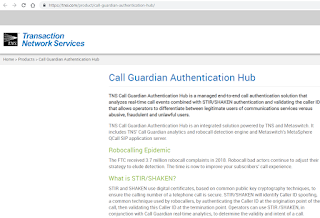Transaction Network Services (TNS) and Metaswitch introduced Call Guardian Authentication Hub, a new hosted STIR/SHAKEN solution that provides carriers with a call authentication solution.
FCC Chairman Ajit Pai has challenged U.S. operators to adopt protocols that combat illegal spoofing and better protect subscribers from unwanted robocalls, or face regulatory action.
Call Guardian Authentication Hub is a fully managed service that combines the TNS Call Guardian analytics and robocall detection solution used by leading U.S. wireless and landline service providers with Metaswitch’s STIR/SHAKEN compliant MetaSphere QCall solution, which enables signing and verifying Caller ID. Metaswitch was the first vendor to both complete successful implementation of a STIR/SHAKEN caller ID authentication solution in the ATIS robocalling testbed and deploy in production with a Tier 1 provider in North America.
The Call Guardian Authentication Hub leverages TNS’ visibility into over 1 billion call events daily resulting from TNS’ connectivity with more than 500 North American carriers. While STIR/SHAKEN enables carriers to sign calls within their own network, the Call Guardian Authentication Hub simplifies signing of inter-carrier calls by automatically authenticating and verifying calls and applying the appropriate call validation treatment. It includes support for universal call blocking of illegal robocalls as defined by U.S. and Canadian regulators.
“For STIR/SHAKEN to dramatically reduce nefarious robocalls, call authentication must extend beyond the Tier 1 carriers that have the budget and resources not available to the hundreds of other smaller service providers,” said Bill Versen, Chief Product Officer at TNS. “Our combined solution with Metaswitch uniquely fills this market gap by offering any service provider operating in North America a feasible path towards rapidly deploying the STIR/SHAKEN call authentication framework.”
While leading U.S. carriers are moving towards STIR/SHAKEN implementation, a majority of cross-carrier U.S. wireless voice traffic does not exclusively transit the networks of the largest carriers, allowing bad actor robocallers to simply continue originating traffic from Tier 2 and 3 carrier networks that do not deploy STIR/SHAKEN compliant solutions. At the same time, Canadian Telecommunications Service Providers (TSPs) have a requirement to implement authentication and verification of caller ID information for Internet Protocol (IP) voice calls to empower Canadians to better protect themselves against nuisance calls.
“As the 2019 TNS Robocall Investigation Report found, only 10% of high risk robocalls come from Tier 1 carriers, which is why carriers of all sizes, as well as telecom regulatory authorities recognize how critical STIR/SHAKEN is to protect their business and consumer subscribers and restore trust in voice calling,” stated Shriraj Gaglani, EVP, Business & Corporate Development, Metaswitch. “Instead of spending months on interoperability testing and other cost-intensive components of STIR/SHAKEN implementation and deployment, carriers can deploy the Call Guardian Authentication Hub in a matter of days.”
An additional capability of this service allows operators to identify and apply treatment to spoofed calls that have traversed non-IP networks or do not have STIR/SHAKEN framework deployed. This multi-layered approach maximizes the effectiveness of the solution.
https://tnsi.com/product/call-guardian-authentication-hub/
http://www.metaswitch.com













